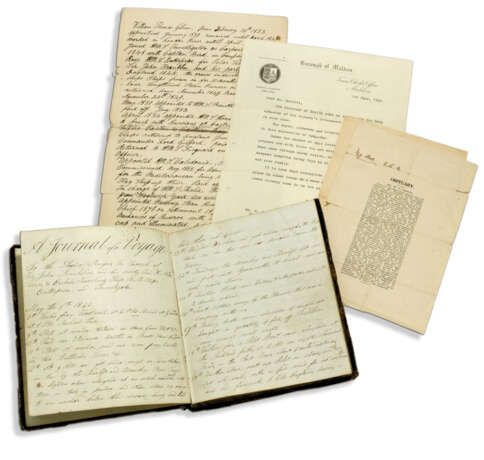ID 470189
Лот 48 | Franklin Search Expeditions
Оценочная стоимость
£ 5 000 – 7 000
Journal of HMS Investigator. 1848
[FRANKLIN SEARCH EXPEDITIONS, 1848]. William Thomas GIBSON (1823-1904). Autograph manuscript signed ('Wm Thos Gibson. Carpenters Mate'), 'A Journal of a Voyage To the Arctic Regions, In Search of Sir John Franklin and his party In H.M.S. Terror & Erebus, Searching Ships H.M. Ships Enterprize and Investigator', 8 May 1848 - 16 September 1849, with a brief coda up to 24 November 1849; and (in reverse orientation) a fragment of 'A Journal of a voyage in H.M.S. Hornet', 18 May - 26 August 1854.
137 pages, 194 x 160mm, sketch map of winter anchorage at Leopold Harbour. Original half green roan (the binding somewhat worn and soiled).
[Together with:] autograph manuscript, list of Gibson's naval service between 1848 and 1878. One page, 330 x 205mm (split at horizontal folds and crudely repaired). Provenance: by descent, apparently to the Barritt family (printed obituary of Gibson's son, in 2 copies, annotated 'My Dad / E.L.B.'; accompanying letter addressed to W. Barritt in 1942).
A carpenter's mate's account of the earliest Franklin search expedition. The 25-year-old Gibson, on his first voyage, provides a highly readable account of the voyage of the Investigator which accompanied the Enterprise under the experienced command of Sir James Clark Ross. This was one of three expeditions to set out in 1848 in search of Sir John Franklin's ships, which had been missing since 1845. The journal begins with the ships' departure from Woolwich, and records their northward voyage up the coast of Greenland, including first encounters with icebergs (‘the appearance of it was beautiful for at a distance it looked like a town and trees growing’) and Inuit (‘we had several of the natives came on board of us they are Coppered Coulored [sic] people and broad faces on them like frying pans’), as well as numerous shooting expeditions. By 14 July they encounter 'a complete barrier of ice, upwards of 1000 feet in hight [sic]’ and progress becomes painfully slow as they attempt to find a way through, often anchoring to icebergs and cutting channels. On 22 August they sight Canada, on the 25th they recover a message in a bottle left by Ross and Parry in 1819, on the 26th they enter Lancaster Sound, and by 13 September they have reached their winter quarters at 'Leopold Harbour' [Port Leopold], where they discover 'the remains of several meat tins, that had been left thier [sic] by Sir John Ross’. On 30 October they bury a shipmate, Thomas Coombes, the first of several to succumb to disease or exposure over the winter (‘we took him ashore on a Sledge, and burried him, in a very nice elm coffin linded with flannel and a Copper Breast plate with his name Engraved on it’). The activities of the winter include the construction of an ice wall to link the two ships, a curious campaign of attaching collars to arctic foxes in the hope of alerting Franklin's party (16 November: 'we ... started a fox, with a collar round his neck, with the ships names stamped on it, and the Latd and Long that we where [sic] in, this was done in hopes that it might be the good fortune for some of Sir John Franklins party to to [sic] fall in with it’), and from January the laying of gravel on the sea-ice in order to speed the spring thaw. Other incidents include an accident in which an unnamed officer returning from a hunting expedition shoots a seaman in the legs, occasional floggings for 'insolence' (including four dozen lashes for a member of a sledging party), and a few incidents in which seamen become 'groggy' and 'stroll away', in at least one case with fatal consequences. From early May, sledging expeditions begin to go out, often suffering severely from cold (‘they did not get much rest they slept in their tents and in the morning thier [sic] blankets was froze to thier wiskers’), frost bite, snow blindness and close encounters with polar bears, but with no sign of Franklin or his ships. By the later summer the overriding preoccupation is the failure of the ice to break up, and the last journal entry records the imminent risk of remaining beset for a second winter: the sudden break-up of the ice and their return voyage are recorded in a brief coda.
| Место происхождения: | Северная Европа |
|---|
| Место происхождения: | Северная Европа |
|---|
| Адрес торгов |
CHRISTIE'S 8 King Street, St. James's SW1Y 6QT London Великобритания | |
|---|---|---|
| Предосмотр |
| |
| Телефон | +44 (0)20 7839 9060 | |
| Комиссия | see on Website | |
| Условия использования | Условия использования |



